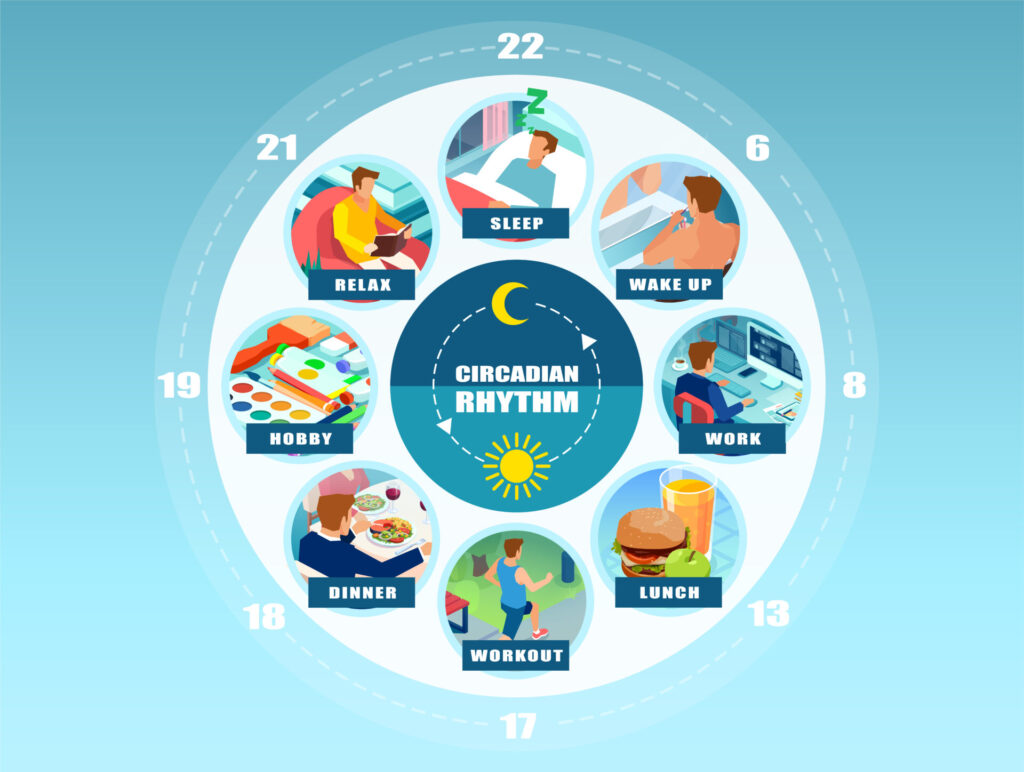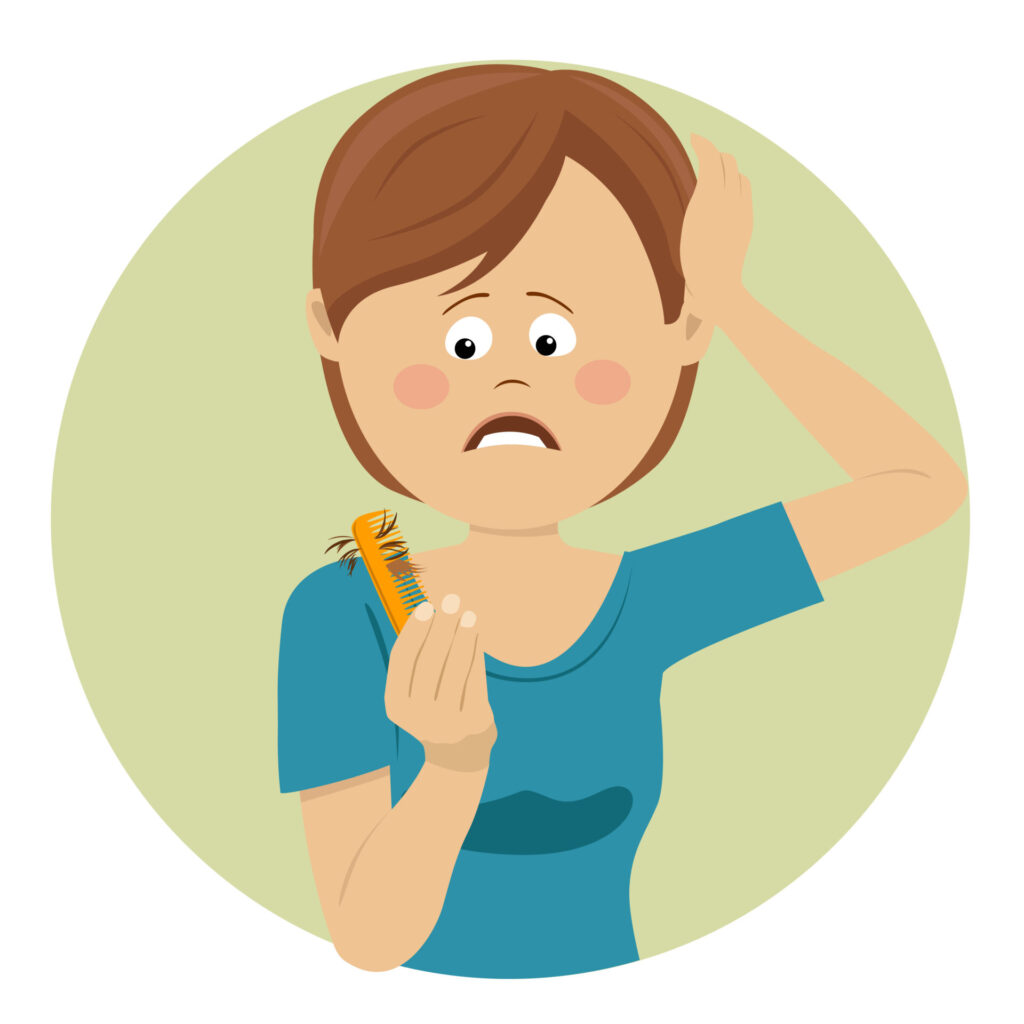
How we organise our lives has a tremendous effect on how our body functions and our biological clock. Known as the circadian rhythm, our efficiency and performance is heavily dependent on pre-determined biological rhythms which are in sync with universal rhythms and rhythms of nature. The position of the moon and sun and other planets also have a significant impact on our biological rhythms, as evidenced by a woman’s monthly cycle.
There are more than 1000 such 24-hour or monthly rhythms that are associated with our biological clock. All control some aspect of our bodily functions, including heart rate, blood pressure, body temperature, hormone levels, digestive juices and more.
All of these rhythms are controlled by the brains pacemaker – the suprachiasmic nuclei. This area of the brain regulates how nerve cells fire, which seems to set off the clocks of our biological rhythms. Health disorders can be triggered by any one or more of these rhythms being disrupted by our lifestyle choices. This can have a knock on effect to other rhythms, resulting in dis-ease and the body going out of balance.
To prevent health problems and maintain good health, it is important to be aware of these rhythms and to balance your lifestyle accordingly.
Natural Sleep / Wake cycles
This is marked by the cortisol cycle. Early morning light triggers the release of cortisol and corticosterone. ( this release triggers the waking response). The levels peak between between 4am and 8am, then gradually decline through the day, with lowest levels being between midnight and 3am. These hormones regulate many important functions in the body, including metabolism, hormone production, blood sugar levels and immune response. The digestive rhythms are also triggered on waking, when the body naturally eliminates toxic waste material accumulated overnight in the bladder and rectum. When this rhythm is disrupted by going to bed at midnight and waking after 8 or 9am, then this process becomes disrupted. An imbalanced cortisol cycle can bring on many health problems. It is common for strokes and heart attacks to occur more often in the morning. Blood clots form most rapidly at around 8am, and Blood pressure rises naturally in the morning and remains high until late afternoon. Then it drops after 6pm and is at it’s lowest during the night.
The neurotransmitter melatonin, secreted by the pineal gland, is a potent hormone, which induces sleepiness. It starts to rise as cortisol starts to drop by mid-morning. It reaches its peak at 1-2am and is at its lowest around midday. The pineal gland controls motor activity, blood pressure, immune system, sleep, reproduction, cellular growth, body temperature and thyroid production. All of these become disrupted when we get out of our natural sleep / wake rhythm, by going to sleep late or working night shifts. Our biological clock gets disrupted.
Seratonin production is also stimulated by early morning light. This neurotransmitter is of vital importance to our physical and emotional wellbeing. It affects memory, sexual behaviour, appetite, impulsiveness, fear and even suicidal tendencies. Levels are reduced if you get up late in the morning, and not getting enough daylight reduces your seratonin levels during the day, which also reduces melatonin levels at night.
The ideal sleep / wake cycle is to go to bed at 10pm and wake up at 6am. Many key bodily housekeeping tasks, growth hormones, liver and gut repair and rejuvenation occur in the body between 10pm and 1am. This is also when we experience our deepest, most restful sleep. So, if you only sleep at midnight or later, you miss out on some of these vital processes which can have a long term impact on your health.
Natural Meal times
Digestion is just one of many processes occurring in the body, and also follows a natural rhythm when digestive juices peak at midday and are at their lowest at midnight. When we follow a natural eating rhythm, our body feels safe and will digest properly. Eating on the run, when stressed or late at night, creates stress on the body, raises cortisol and causes digestion to slow down.
The ideal eating window is for around 10 hours between 8am and 6pm, with the largest meal being consumed at midday, when bile and pancreatic enzymes are at their highest levels..
Intermittent fasting between 7pm and 7am, allows the body to take a rest from digestion and to cleanse itself overnight. The Migratory Motor Complex (MMC), is a process that ‘brushes’ food debris down the digestive tract to be eliminated. The MMC only kicks in when the stomach and colon are mostly empty. This is also why it’s important to leave 3-4 hours between meals during the day, and avoid snacking in the evening.
Natural Lifestyle
Maintaining a natural lifestyle that is in tune with nature is key to sustaining an optimal circadian rhythm, as the body naturally resonates with the energy frequency of the earth, and connects in to the daily cycles as well as seasonal cycles.
Spending too much time indoors, with artificial lighting, and watching television has a detrimental effect on these natural rhythms. Additionally, watching television for hours at a time has been shown to raise cortisol levels, which is not desirable in the evening before going to bed. The stimuli emitted from television is too much for the brain to process, with an overwhelming number of rapidly changing picture frames appearing every second. This creates dissonance in the body and tour biological clock become confused and out of synch. This ultimately leads to poor sleep, more stress and long term health problems.
Exercise and moving the body is also important to maintain the natural rhythms of the heart and the lymph flow. These are vital to life and should not become stagnant. Muscle tension when exercising, acts as a pump for the lymphatic system, which becomes clogged when the body stagnates and becomes too sedentary. This causes oedema and fluid builds up in the arms and legs putting further pressure on the heart and lymph glands.
It’s Simple
We are naturally very close to nature, as were our ancestors, who lived by their biological clock. Modern living with all its commodities and technology, has removed us from our natural roots, and allows us to live unconsciously and mindlessly in a world of convenience. We no longer attune with nature, unless we make a conscious decision to do so.
So, switch off the television, go to bed at a reasonable time, get up early and head outdoors. This is when the earth’s energy is at it’s strongest, and the light is subtle enough to nourish you without causing UV damage. Morning exercise also uses up excess cortisol and the light on your retina, kicks off melatonin production to give you a good nights sleep.
Let us celebrate the ancient rhythms of nature and go back to who we really are. We are children of the universe, at one with nature, the stars and all of humanity. We are the Rhythm of Life itself.
NEXT STEPS
If you would like to learn more about your Circadian Rhythm and how to improve your sleep and energy levels, I warmly invite you to book in for a free 20-minute Discovery call to see if a personalised nutrition and lifestyle plan might help.
You can book a call directly into my diary by clicking right HERE.





0 Comments